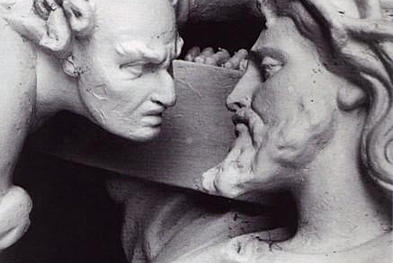Genesis
9:8-17
Psalm
25
1 Peter 3:18 -22
Life is bewildering enough without having to be thrown into
the wilderness.
“Thrown.” That is actually the meaning of the word in Greek.
“Immediately the Spirit threw him out -- ekballei -- into the desert, the
wilderness -- erhmon --
the desolate place, the place of hermits. Jesus is thrown from his place of
chosenness, where God has named him as Son, beloved, favored one, into a
dangerous place, full of wild beasts. Looking up the Greek word for beast in a
dictionary, one finds several references to beasts as the animals to which
people were thrown for punishment and death. Capital punishment was a genuine,
gruesome spectator sport.
On the other hand, perhaps these 40 days were not all bad
for Jesus; the text also tells us angels served him. The word is dihkonoun, the
root of the word deacon. The angels were the first Christian deacons. This
wilderness is also the place where Jesus first found the strength to resist: he
resisted the temptations of Satan, a process which apparently steeled him for
the rest of his ministry, when he would resist the powers and principalities
who were Satan’s human agents in first century Palestine.
Water – the water of baptism in particular – is understood
as a vehicle of salvation. Good Noah and his family were, as St. Peter says,
“saved through water.” The water of baptism is not a mere cleansing of the body,
but “an appeal to God for a good conscience.” Yet water also can be powerful
and dangerous, a bringer of death and destruction. God may have allowed Noah
and his family to live, but the rest of the human race was destroyed. God saved
those eight humans – as well as all the progenitors of the wild beasts which
later prowled around the desolate Jesus in the dry wilderness. In the waters of
baptism, Jesus experienced near-death by drowning, and came out of the waters
raised to new life and new status. He is then thrown into the desert for
another encounter with near-death and comes out as a steeled and experienced
resistance fighter. The first thing he hears when he comes out of the desert is
that John the Baptist has been killed. Jesus, now schooled and hardened in the
desert responds, “The kingdom of God is at hand; repent and believe in the Good
News.”
Good News?? Is this the way God works?? Is the rainbow, the
sign of God’s covenant never again to destroy the people of God, GOOD NEWS??
Has this Good News not come at a terrible price for the human race? A
destructive flood, and as the earth dries out, a newly created desert and
wilderness? God does work in bewildering ways.
Perhaps this is why these dramatic, short and scary stories
appeal to us: our own lives – and certainly the world we live in -- are at
times bewildering and frightening. People are forever being left desolate, or
drowned. Just when we think we’re sinking never to rise again, a hand pulls us
out from the deep, only to throw us into a worse place than we were before.
And then: good news: Satan’s temptations do not win Jesus
over. The wild beasts do not eat him, he does not shrivel or starve in the
desert heat, and angels take care of him. Even God thinks twice before getting
so angry again, so angry as to destroy the human race. Out of what is terrible
comes a new way of life: the kingdom of God is at hand.
Lent can be about a personal struggle in the wilderness.
Challenges at work, with our families – what
one day is ordinary busy-ness
turns the next day into a mountain of stress. During Lent we can think about
our private sins and shortcomings. But I also think these stories today play
out on a larger stage, a global stage. Sabers rattle, rockets blast
destruction, troops are deployed: As talk of war swirls around us, these
stories call us to global repentance, to a change of heart from destruction to
peace, from floods which drown to waters which cause the deserts to bloom. The
wild beasts which prowl menacingly are also the ones we can imagine nurturing
and keeping alive 40 days in the ark of our salvation. Who are our wild beasts?
With what temptations does Satan come to us, as individuals and as a nation?
And who are the angels who will serve us and nurture us into the new way of
life which is the reign of God?



No comments:
Post a Comment